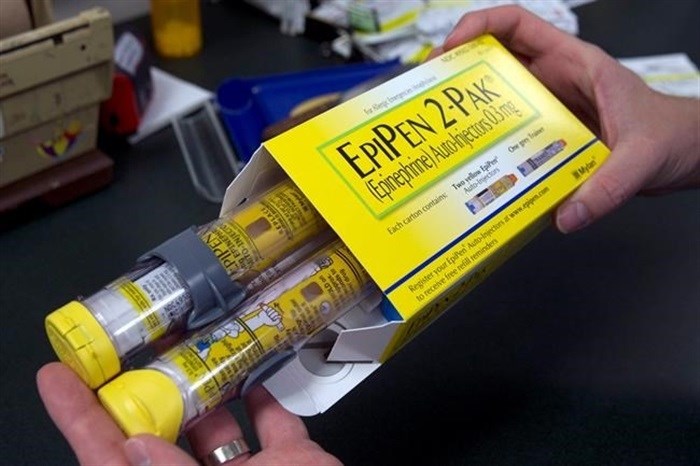
In this July 8, 2016, file photo, a pharmacist holds a package of EpiPens epinephrine auto-injector, a Mylan product, in Sacramento, Calif.
Image Credit: THE CANADIAN PRESS/AP-Rich Pedroncelli
May 06, 2021 - 5:30 AM
New guidelines aimed at helping schools and daycares protect children with allergies say there's no evidence that blanket bans on specific foods protect children.
The guidelines, created by an international panel of stakeholders including health-care experts, school principals, parents and professional allergy organizations, also recommend that schools keep a supply of epinephrine auto-injectors.
The guidelines, based on a review of the scientific evidence and published in the Journal of Allergy and Clinical Immunology on Wednesday, are the first of their kind, said Dr. Susan Waserman, the chair of the guidelines panel and a professor of medicine at McMaster University in Hamilton, Ont.
"In many ways, these guidelines support a lot of the practices that have been going on in schools for a long time: identifying children at risk, providing them with an anaphylaxis action plan, teaching teachers and all school personnel to recognize allergic reactions and to act appropriately, good hygienic practices such as hand washing," Waserman said in an interview Tuesday.
However, the recommendations around food bans and epinephrine auto-injectors, often known by the brand name EpiPen, are different from current practice, she said.
"We did not find evidence to support the practice of site-wide food banning, meaning that things such as peanut-free schools, peanut-free classrooms, or milk-free classrooms, or milk-free schools, or your food of choice, was not supported in the literature that we found as a consistent way of cutting down on allergic reactions in the school situation," Waserman said.
Bans on specific foods don't teach children how to manage their allergies, and if children with allergies are always required to sit at a specific table, that can lead to stigma, she said.
"We just see this as better safety management within the school situation and better quality of life for those children who are not mandated to always eat in a peanut-free area or other food-related area," Waserman said.
However, teachers, parents and, in some cases, older students have a role to play. "School-aged children are not expected to do this on their own," she said. The guidelines should also be adapted to the specific situation in a school or daycare, she said, adding that in some cases, such as with very young children, a classroom ban on specific foods might make sense.
As for epinephrine auto-injectors, Waserman said schools typically require students with allergies to bring their own, which are generally stored in a single place.
A switch to schools having their own supply of auto-injectors would help ensure that students who have not yet been identified as having a serious food allergy are protected, the guidelines say.
Waserman said it would also be more equitable for students whose families can't afford auto-injectors — or can't afford multiple injectors — and it would allow students who have their own auto-injectors to carry the device with them when they leave school.
While the guidelines are based on the "best available evidence" more research is also needed on allergenic reactions and the use of epinephrine in schools, Waserman said.
The guidelines are endorsed by the Allergy and Asthma Network, the American Academy of Allergy, Asthma and Immunology, the American College of Allergy, Asthma and Immunology, the Canadian Society of Allergy and Clinical Immunology and the World Allergy Organization.
This report by The Canadian Press was first published May 5, 2021.
———
This story was produced with the financial assistance of the Facebook and Canadian Press News Fellowship.
News from © The Canadian Press, 2021